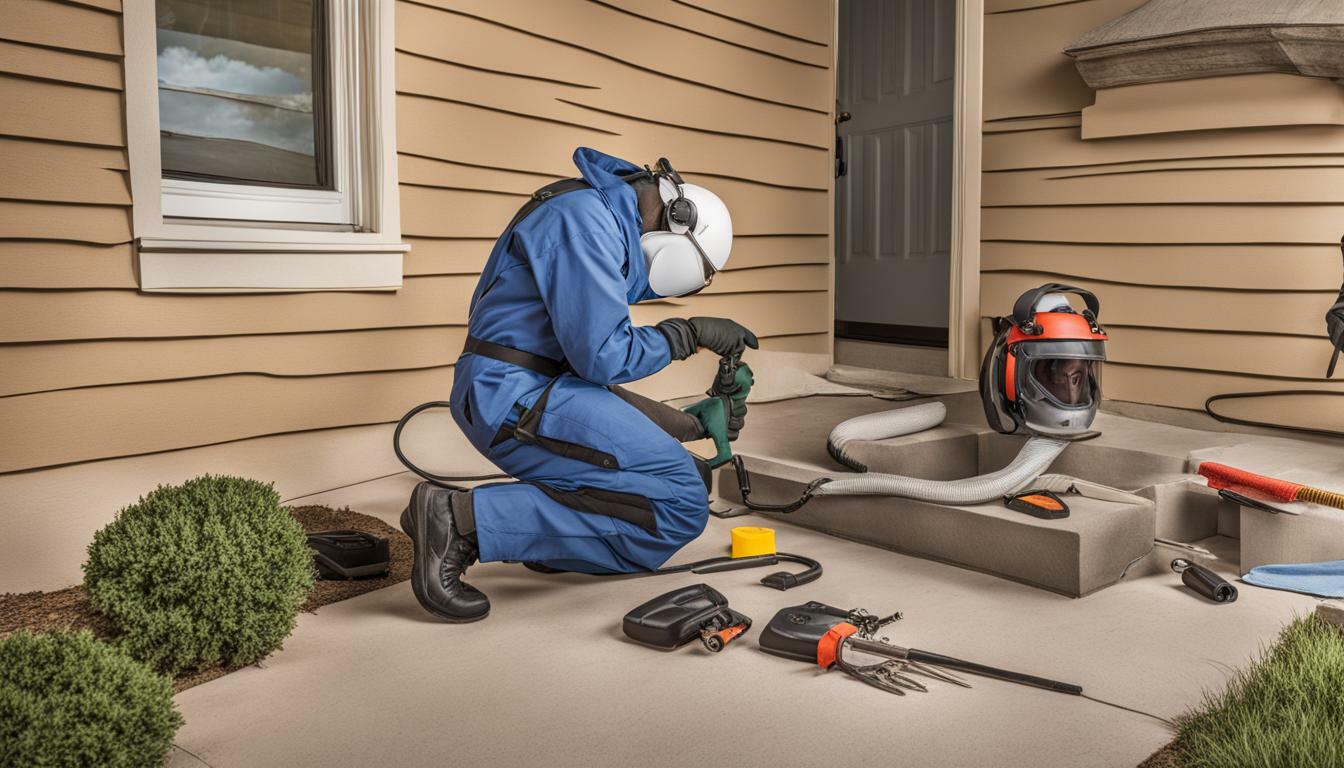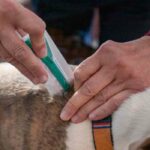
If you are facing a rat infestation, it’s essential to seek the assistance of a rat exterminator. A rat exterminator is a professional who specializes in rodent control and pest removal. They play a crucial role in identifying and addressing rat infestations effectively. In this section, we will explore the responsibilities of a rat exterminator and how they work to eliminate rat infestations.
Key Takeaways:
- A rat exterminator is a professional who specializes in rodent control and pest removal.
- Their main objective is to eliminate rat infestations and prevent future occurrences using various methods and techniques.
- Effective pest management is crucial in ensuring a rat-free environment.
Rat Infestation Assessment and Inspection
As a rat exterminator, my first task when addressing a rat infestation is to conduct a thorough assessment of the rat activity in the affected area. This involves inspecting the premises to identify entry points, droppings, gnaw marks, and other signs of rat infestations.
By understanding the extent of the problem, I can determine the appropriate course of action to exterminate the rats and prevent future occurrences. I look for any evidence of rat activity, such as chewed wires, ripped up insulation, or shredded paper. These are all indications of a rat infestation.
I also examine the exterior of the building for entry points. Rats can enter through any opening larger than ½ inch, including vents, pipes, and cracks in foundations. I identify these entry points and recommend sealing them off to prevent further intrusion.
| Rat Activity Signs | Description |
|---|---|
| Droppings | Rat droppings are small, dark, and pellet-shaped. |
| Gnaw Marks | Rats have strong teeth and will gnaw on anything to keep them sharp. Look for gnaw marks on wires, pipes, and walls. |
| Grease Marks | Rats leave greasy smudges on surfaces where they travel, as their fur carries oil. |
| Noises | Rats are nocturnal and can be heard rustling and scurrying around at night. |
In summary, a thorough inspection of the premises helps me understand the extent of the rat infestation and identify entry points. This allows me to develop an effective plan to exterminate the rats and prevent future occurrences.
Rat Extermination Methods
As a rat exterminator, my main objective is to eliminate rat infestations and prevent future occurrences. To achieve this, I use various methods that are highly effective in rodent control and pest removal.
Trapping
One of the most common methods of rat extermination is trapping. Traps are set up in areas where rats are most active, and bait is used to lure them in. I prefer to use humane traps that allow me to capture the rats without harming them. Once trapped, I release the rats at a safe location far from the premises to prevent re-infestation.
Baiting
Baiting is another method of rat control that involves using poison baits to eliminate rats. This method is highly effective, but it requires careful use to prevent harm to non-target animals like pets. I always ensure that the baits are placed in areas that are inaccessible to pets or children.
Rodenticides
Rodenticides are specialized chemicals designed to exterminate rodents. As a rat exterminator, I use rodenticides as my last resort to address severe rat infestations. Rodenticides work well, but they are not environmentally friendly and can harm non-target animals.
Exclusion Techniques
Rat exterminators also employ exclusion techniques to control rat infestations. These techniques involve sealing all possible entry points that rats use to access the premises. By blocking all entry points, the rats are restricted from gaining access, and the infestation is controlled.
Snap Traps
Snap traps are another effective method of capturing rats. These traps are designed to snap shut and kill the rats instantly once they take the bait. I only use snap traps as a last resort when other methods have failed.
Rat Prevention Strategies
As a rat exterminator, my job is not only to eliminate current rat infestations but also to prevent future occurrences. One of the most effective prevention strategies is to create an environment that is unattractive to rats. This can be achieved by implementing the following practices:
- Sanitation: Maintaining cleanliness and proper waste disposal is critical in preventing rat infestations. Rats are attracted to areas with easy access to food and water, so it is important to eliminate any potential food sources.
- Maintenance: Regular maintenance of your property, such as repairing holes in walls and floors, can help prevent rats from entering your home.
- Debris Removal: Removing all debris, such as piles of leaves and wood, can eliminate possible hiding places for rats, reducing the chances of an infestation.
- Rodent-proofing: Sealing any potential entry points, such as gaps in doors and windows, will prevent rats from entering your home.
By following these prevention strategies, you can significantly reduce the risk of future rat infestations in your home.
Educating Homeowners on Rat Control
As a professional rat exterminator, I understand the importance of raising awareness about the signs of rat infestations. By knowing what to look for, homeowners can detect issues early on and prevent the situation from escalating. Common signs of rat activity include droppings, gnaw marks, and the presence of nests or burrows.
DIY prevention methods are an effective way to reduce the risk of rat infestations. Maintaining cleanliness and eliminating food sources are crucial steps in rodent control. However, it is important to note that DIY measures alone may not be enough to address all rat infestations. Seeking the assistance of a professional rat exterminator ensures effective and long-lasting results.
Professional consultation not only helps in exterminating rats but also in implementing prevention strategies. As an exterminator, I educate homeowners on proper sanitation practices such as regular maintenance, debris removal, and proper waste disposal. Additionally, I assist in rodent-proofing the premises by sealing potential entry points and eliminating attractants for the rats.
“Homeowners must understand the importance of professional consultation to address rat infestations. By working with a rat exterminator, they can develop effective prevention and control strategies to protect their homes.”
In conclusion, awareness of signs of rat activity, DIY prevention, and professional consultation are crucial in effective rodent control. As a rat exterminator, I strive to educate homeowners on the importance of these measures to prevent and address rat infestations.
Conclusion
In conclusion, as a rat exterminator, I know that rat infestations can be a severe problem for homeowners. These rodents can cause significant damage to your property, contaminate food and water sources, and spread diseases. Therefore, it is essential to seek the services of a professional rat exterminator.
My job involves assessing and inspecting the extent of rat activity, utilizing various extermination methods, and implementing prevention strategies. Moreover, I emphasize the importance of educating homeowners about rat control measures to prevent future occurrences.
If you suspect a rat infestation, do not hesitate to seek professional assistance. My team and I are available to help you address the situation promptly and efficiently. Remember, effective rat control requires a proactive and comprehensive approach, and we are here to help you every step of the way.
FAQ
Q: What does a rat exterminator do?
A: A rat exterminator is a professional who specializes in rodent control and pest removal. They eliminate rat infestations and prevent future occurrences through various methods and techniques.
Q: What is the role of a rat exterminator?
A: The main objective of a rat exterminator is to eliminate rat infestations and prevent future occurrences. They assess and inspect rat activity, utilize extermination methods such as trapping and baiting, implement prevention strategies, and educate homeowners on rat control.
Q: How does a rat exterminator assess a rat infestation?
A: Before devising a plan, a rat exterminator conducts a thorough assessment of the rat activity in a particular area. This involves inspecting the premises to identify entry points, droppings, gnaw marks, and other signs of rat infestations.
Q: What methods does a rat exterminator use to exterminate rats?
A: Rat exterminators employ various methods to exterminate rats, including trapping, baiting, rodenticides, exclusion techniques, and snap traps.
Q: How does a rat exterminator prevent future rat infestations?
A: Rat exterminators focus not only on eliminating current rat infestations but also on preventing future occurrences. They educate homeowners on proper sanitation practices, assist in rodent-proofing the premises, and eliminate attractants for rats.
Q: How can homeowners contribute to rat control?
A: Homeowners can contribute to rat control by maintaining cleanliness, eliminating food sources, and being aware of signs of infestation. However, it is recommended to seek professional consultation for effective and long-lasting results.
- Does Flea Treatment Kill Lice? - September 8, 2023
- Does Flea Treatment Kill Mites? - September 8, 2023
- How to Put Flea Treatment on a Dog? - September 8, 2023






